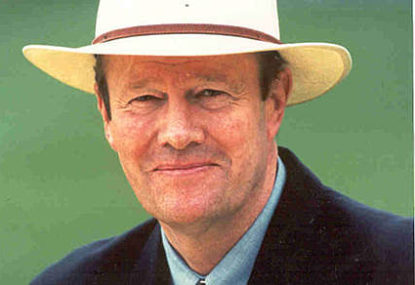Much has been written on Tony Greig, the tall titan of multifarious talent. Today I want to compare him with other great all-rounders of the last 50 years.
He was an all-rounder in many senses, not just a top class batsman, bowler, fielder and captain. He was tri-national; born in South Africa, played Test cricket and captained England and settled in Australia as a unique cricket commentator on Channel Nine.
He was a household name, known not only to cricket-lovers. His accent and style as a commentator was imitated around the world by young and old, men and women; his key in the pitch was a signature tune that unlocked many doors of apathy and rancour.
Not to forget his role in the formation of World Series Cricket as a right hand man and mouthpiece of Kerry Packer. With Richie Benaud, Greigy changed the face of cricket as few Test players before him – on the field and off it.
The purpose of this post is to compare him statistically with great post-1960 all-rounders in more or less chronological order: Benaud, Alan Davidson, Trevor Goddard, Garry Sobers, Ian Botham, Imran Khan, Kapil Dev, Richard Hadlee, Wasim Akram, Chris Cairns, Shaun Pollock, Daniel Vettori, Andrew Flintoff and Jacques Kallis.
So here are their Test figures, starting with Grieg.
Tony Greig (England): 3599 runs at 40.43 (eight centuries), 141 wickets at 32.20 (5w/i 6 times) and 87 catches in 58 Tests.
Richie Benaud (Australia): 2201 runs at 24.45 (three centuries), 248 wickets at 27.03 (5 wickets in an innings 16 times) and 65 catches in 63 Tests.
Alan Davidson (Australia): 1328 runs at 24.59 (no century), 186 wickets at 20.53 (5w/i 14 times) and 42 catches in 44 Tests.
Trevor Goddard (South Africa): 2516 runs at 34.46 (one century), 123 wickets at 26.22 (5 w/i 5 times) and 48 catches in 41 Tests.
Garry Sobers (West Indies): 8032 runs at 57.78 (26 centuries), 235 wickets at 34.03 (5w/i 6 times) and 109 catches in 93 Tests.
Ian Botham (England): 5200 runs at 33.54 (14 centuries), 383 wickets at 28.40 (5w/i 27 times) and 120 catches in 102 Tests.
Imran Khan (Pakistan): 3807 runs at 37.69 (six centuries), 362 wickets at 22.81 (5w/i 23 times) and 28 catches in 88 Tests.
Kapil Dev (India): 5248 runs at 31.05 (eight centuries), 434 wickets at 29.64 (5w/i 23 times) and 64 catches in131 Tests.
Richard Hadlee (New Zealand): 3124 runs at 27.16 (two centuries), 431 wickets at 22.29 (5w/i 36 times) and 39 catches in 86 Tests.
Wasim Akram (Pakistan): 2898 runs at 22.64 (three centuries), 414 wickets at 23.62 (5w/i 25 times) and 44 catches in 104 Tests.
Chris Cairns (NZ): 3320 runs at 33.53 (five centuries), 218 wickets at 29.40 (5w/i 13 times) and 14 catches in 62 Tests.
Shaun Pollock (South Africa): 3781 runs at 32.31 (two centuries), 421 wickets at 23.11 (5w/i 16 times) and 72 catches in 108 Tests.
Daniel Vettori (NZ): 4516 runs at 30.10 (six centuries), 360 wickets at 34.42 (5w/i 20 times) and 58 catches in 112 Tests.
Andrew Flintoff (England): 3845 runs at 31.77 (five centuries), 226 wickets at 32.78 (5w/i 3 times) and 52 catches in 79 Tests.
Jacques Kallis (SA): 12980 runs at 56.92 (44 centuries), 282 wickets at 32.57 (5w/i 5 times) and 192 catches in 158 Tests.
In summary, Sobers, Kallis, Botham, Imran, Kapil, Hadlee and Akram are on the top of the tree based on stats.
In this group of 15 all-time great all-rounders post-1960, Greig has the third highest batting average (40.43) after Sobers (57.78) and Kallis (56.92). The next best is Imran (37.69).
Besides, Greig was the first from England to score a century and take five wickets in a Test innings; scoring 148 runs and capturing 6 for 164 against the West Indies in the 1973-74 Bridgetown Test. He was also the first one to achieve the double of 3000 runs and 100 wickets for England.
Additionally, he was among four cricketers to have averaged more than 40 with the bat and less than 35 with the ball in the history of Test cricket; others being Aubrey Faulkner of South Africa in 1900s, Sobers and Kallis.
Statistics aside, he was an inspirational leader of men who called an axe an axe, whether you liked it or not.





























































































